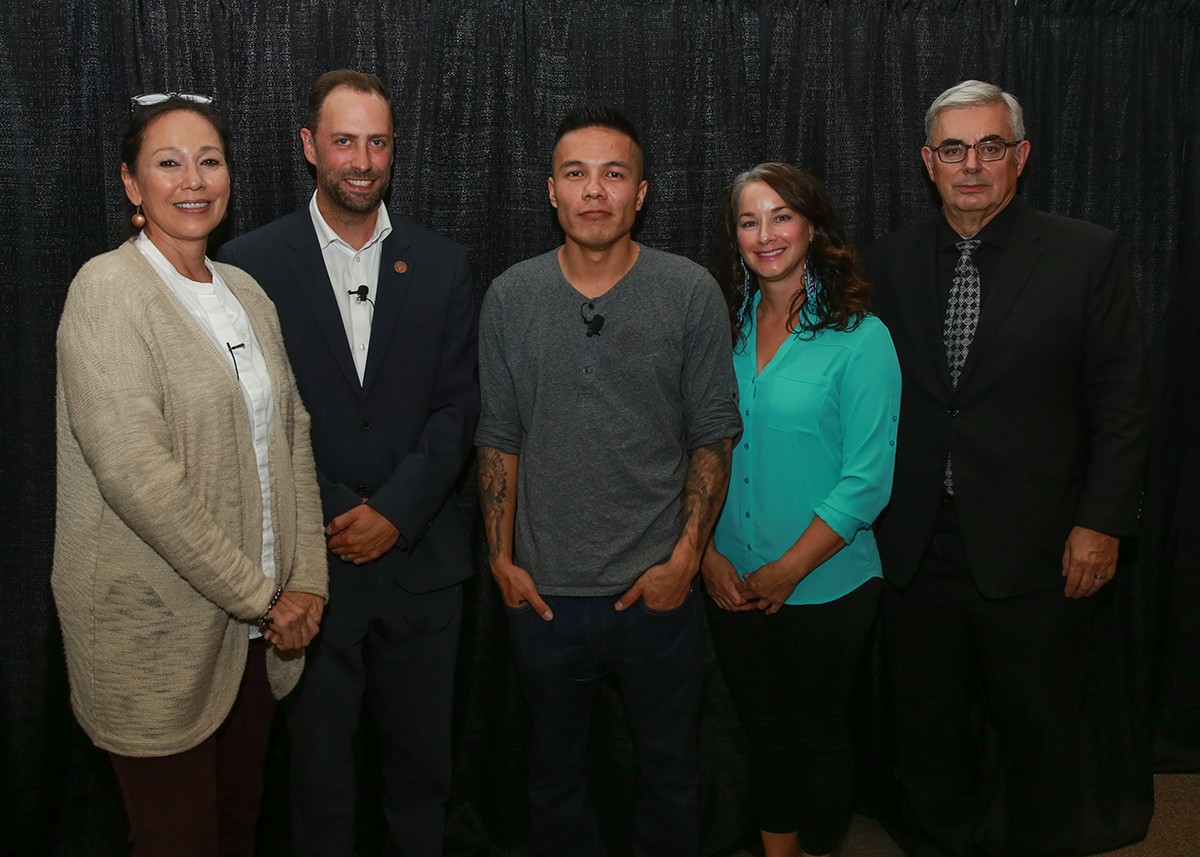
The 2016 season of Visionary Conversations launched with a panel discussion on Reconciliation. (Left to right: Tina Keeper, Ry Moran, Lenard Monkman, Nahanni Fontaine, moderated by President David Barnard)
Moving towards Reconciliation
Launch of the 2016 Visionary Conversations series discusses next steps
Willow weeps in silence
Ancient ways abandoned
Traditional knowledge forgotten
No one sharing.
The quote above is from Ovide Mercredi’s poem, “Willow Weeps” and his collection of poetry titled My Silent Drum.
President David Barnard began the discussion for the 2016 season of Visionary Conversations using these powerful words of the former National Chief of the Assembly of First Nations and University of Manitoba alumnus. Because of the sensitivities surrounding Reconciliation and the tender memories of the Residential School System, Barnard then urged the audience to be open to the discussion that would follow.
“Let us share this space, respectfully. Let us share ideas and dreams, knowledge and stories,” said Barnard.
The Truth and Reconciliation Commission of Canada (TRC) examined the failures of the Residential School System and issued 94 calls to action on June 2, 2015. Justice Murray Sinclair, chair of the Commission, said “Reconciliation is not an aboriginal problem, it is a Canadian problem. It involves us all.”
One year after the inauguration of the National Centre for Truth and Reconciliation the nation-wide conversation continues.
In front of a packed and engaged audience, the 2016 season of Visionary Conversations launched with a discussion that addressed how the country can move forward in Reconciliation. Four distinguished panelists from the Indigenous community whose voices need to be heard shared their thoughts, formed from both personal experiences as well as professional and academic backgrounds.
Nahanni Fontaine is Status Ojibway from the Sagkeeng Anishinaabe First Nation. Last fall she ran successfully for the provincial riding of St. Johns and serves as the NDP critic for Status of Women, Persons with Disabilities, Families, and Missing and Murdered Indigenous Women and Girls. She’s also a University of Manitoba alumna.
Fontaine began by acknowledging members of the Indigenous community who first shared light on the uncomfortable truth of the Residential School System.
“For years and years, those that went into Residential Schools, didn’t speak about it,” said Fontaine. “We’re only sitting here today because of courageous individuals.”
Prominent actor and producer Tina Keeper became a strong voice for northern and Indigenous issues when she served as the Member of Parliament for the federal riding of Churchill. The honorary witness of the TRC said its call to actions are a fantastic framework but there’s still work to be done.
“I think we need to empower our own youth–ourselves as Indigenous people–to understand what those strengths were. We’re not moving fast enough by trying to create Aboriginally aware workplaces. We’re not really engaging in a process that is enabling capacity within the Aboriginal community,” said Keeper.
Lenard Monkman has been instrumental in building bridges between the Indigenous and non-Indigenous communities in Winnipeg. The Anishinaabe, University of Winnipeg student from Lake Manitoba First Nation is also an associate producer for CBC Indigenous.
Monkman said he sees change, especially among youth, asking the audience why there are systemic issues such as high incarceration and child welfare rates within the Indigenous community.
“We change that by instilling confidence in the next generation. We won’t have real confidence until our people are able to pick up their drums and actually sing their songs or speak their language on the bus.”
As the Director of the National Centre for Truth and Reconciliation at the U of M, Ry Moran and his team is carefully collecting testimonies from the TRC and archival documents of the Residential School System. In speaking with Indigenous people and communities across the country, these collective memories need to be shared in order to move forward, toward Reconciliation.
“This is a long journey we are on,” said Moran. “We as a society–as a collective mainstream Canadian society–need to come to terms with what this history means. Through education, experiential learning, we need to start feeling the history from the heart.”
Watch the full discussion in the video below






